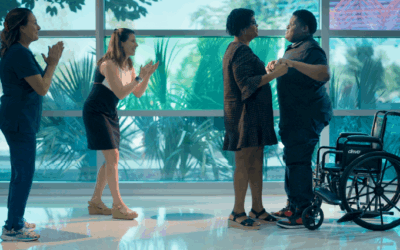A former collegiate and semi-professional soccer player, Nicholas (Nick) LeBlanc, MD, always had an appreciation for the impressive capabilities of the human body.
“Early on, I knew I wanted to devote myself to learning about it and using that knowledge to help people,” he says.
Dr. LeBlanc earned his bachelor’s degree in exercise physiology from Furman University in Greenville, South Carolina. He then attended Louisiana State University School of Medicine in New Orleans.
When he befriended a general surgeon in medical school, Dr. LeBlanc knew where he would help people. In the operating room.
A Doctor on a Mission
To finish his studies, Dr. LeBlanc completed a residency in general surgery at Virginia Tech-Carilion Clinic in Roanoke, Virginia. This was followed by fellowship training in thoracic (chest) surgery at the University of Manitoba Health Sciences Centre in Winnipeg, Canada.
He is Board Certified by the American Board of Surgery, specializing in the diagnosis, treatment and care for benign, malignant and traumatic diseases involving the esophagus, lungs, mediastinum, chest wall, trachea, pleura, stomach and diaphragm.
Since joining Our Lady of the Lake Physician Group Thoracic Surgery, Dr. LeBlanc has felt he’s where he belongs. According to him, the thoracic surgery department is a family.
“Our advanced care providers all share the same goal,” Dr. LeBlanc says. “We work together to provide patient-centered care and the best possible results.”
To reach this goal, Dr. LeBlanc and his colleagues make use of advanced surgical techniques, including robotic assistance. While many thoracic surgeries once required large incisions and long hospital stays, robot-assisted surgeries changed that.
With the help of surgical robots, Dr. LeBlanc can perform many procedures with small incisions. This leads to less pain, reduced time spent in the hospital and faster recovery.
Dr. LeBlanc uses robotic-assisted surgery to remove esophageal tumors and cancers and lung tumors and cancer, as well as for procedures such as mediastinal tumor resection, tracheal surgery, diaphragm surgery, fix complex hiatal and diaphragm hernias.
“The ever-advancing robotic platform is fascinating,” he says. “As the technology improves, we are discovering new ways to treat patients with minimal disruption to their regular lives, all while maintaining the highest standards in cancer surgery.”
Surgeons like Dr. LeBlanc can map and locate small lung nodules with the robotic bronchoscopy platform. Surgery is then performed under the same anesthesia event to remove the nodule in a way that preserves healthy lung tissue while appropriately removing the targeted area.
“In the near future, we may be able to locate these lesions through the robotic bronchoscope and inject therapies that will help treat lung cancers,” Dr. LeBlanc says.
Why Thoracic Surgery?
Recently, thoracic surgery has made tremendous advances. For Dr. LeBlanc, these advances have led him to have a particular interest in esophageal surgery.
Just a few years ago, precancerous lesions and early-stage cancers were removed from the esophagus by performing a major operation and resulted in lengthy hospitalization. Today, the procedure can be done through a thin, flexible tube called an endoscope. The surgeon guides the tube down the throat to the site of the mass. The surgeon then removes the suspicious or cancerous area leaving no external incisions or visible scars.
Should a patient require esophagectomy (removal of the esophagus), the robot is put to use. Again, a minimal invasion with a quick recovery.
For Dr. LeBlanc, this is a reason to celebrate. It’s also part of what draws him to thoracic surgery.
When it comes to advanced endoscopic procedures for esophageal conditions, Dr. LeBlanc is the only surgeon in the region who performs the PerOral Endoscopic Myotomy (POEM) for achalasia as well as the Endoscopic Submucosal Dissection (ESD) to remove precancerous and early esophageal cancer or esophageal tumors.
For airway procedures, Dr. LeBlanc performs rigid and flexible bronchoscopy with the Ion robotic biopsy tool as well as endobronchial tumor resections and ablations. He can also perform endobronchial ultrasound (EBUS) bronchoscopy to visualize the inside of the lungs and lymph nodes.
“I am maintaining sound cancer resection standards and safely removing tumors from the esophagus using the endoscope,” Dr. LeBlanc says. “I am helping patients avoid a surgical incision and minimizing discomfort and time away from their normal activities.”
Dr. LeBlanc says he loves the challenges of this field of medicine, dealing with complex organ systems that overlap other fields of medicine.
“Being able to navigate these complex cases with my patients has been tremendously rewarding. Thoracic surgery truly is a team sport as we work closely with many medical colleagues from medical oncology, radiation oncology, surgical oncology, to pulmonology, gastroenterology, interventional radiology, family practitioners and cancer care coordinators — just to name a few,” he says. “Our wonderful team prides itself in providing the best possible care with the utmost respect for patients during the difficult journey of a cancer diagnosis.”
Thankful to Be Home
On top of surgical robots, being with Our Lady of the Lake Physician Group has another appeal. For Dr. LeBlanc, Louisiana is home. Originally from Lafayette, he’s grateful to work near his family and friends, where he can enjoy his Cajun roots.
Over the years, Dr. LeBlanc has competed in several triathlons and other endurance races.
What other passions does he have? Animals. He and his wife, Mary Gentry LeBlanc, have two horses (Oliver and Wilano), one miniature horse (Toulouse), a dog (Effie), two cats (Ophelia and Cleo), and a rescued squirrel who still hangs around the house (Petunia).
“If I wasn’t practicing human medicine, I would want to be a veterinarian,” Dr. LeBlanc says. “In fact, whenever I retire from surgery, I plan to volunteer in a veterinary clinic.”
But don’t worry. That’s not happening any time soon. Surrounded by family and friends in the community he loves, Dr. LeBlanc looks forward to serving his neighbors for years to come.




